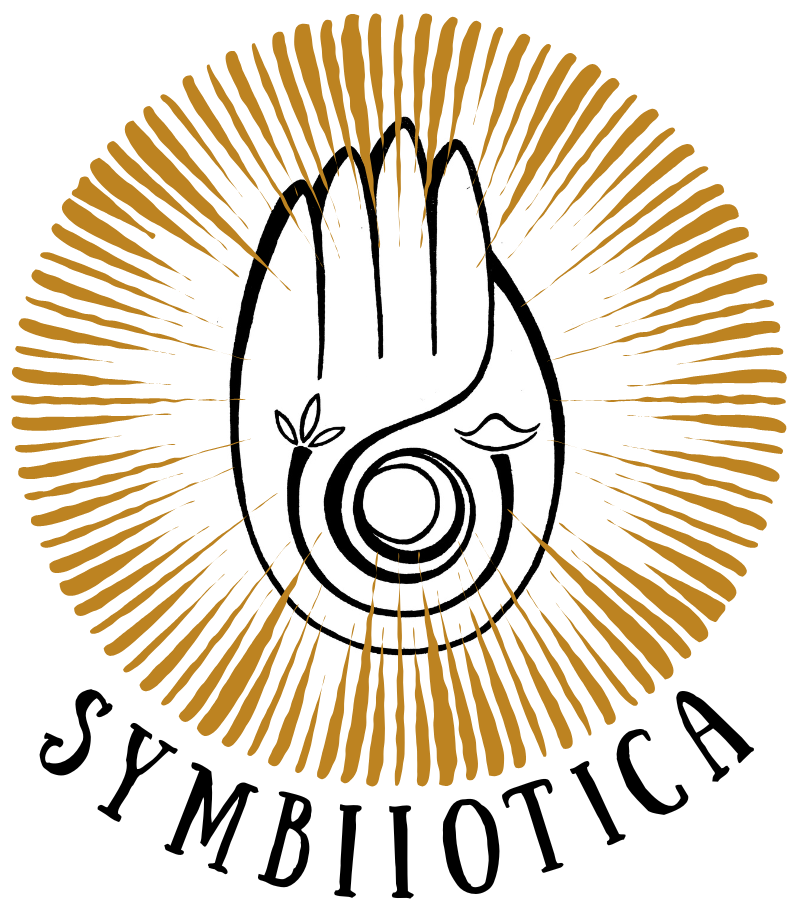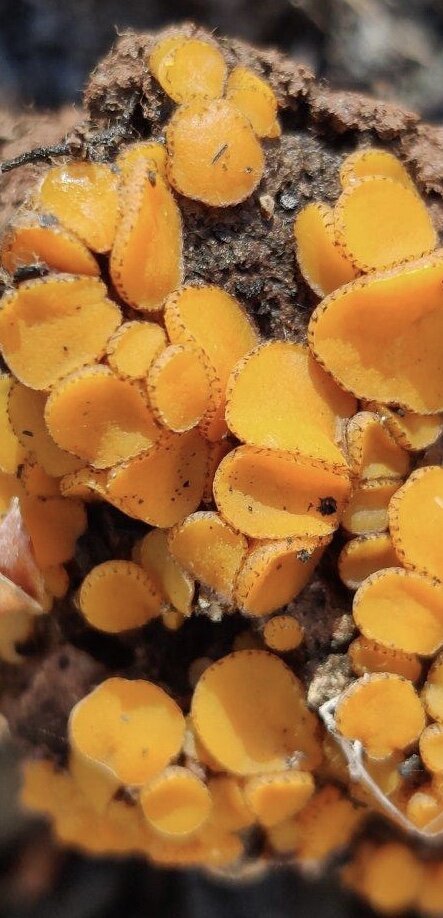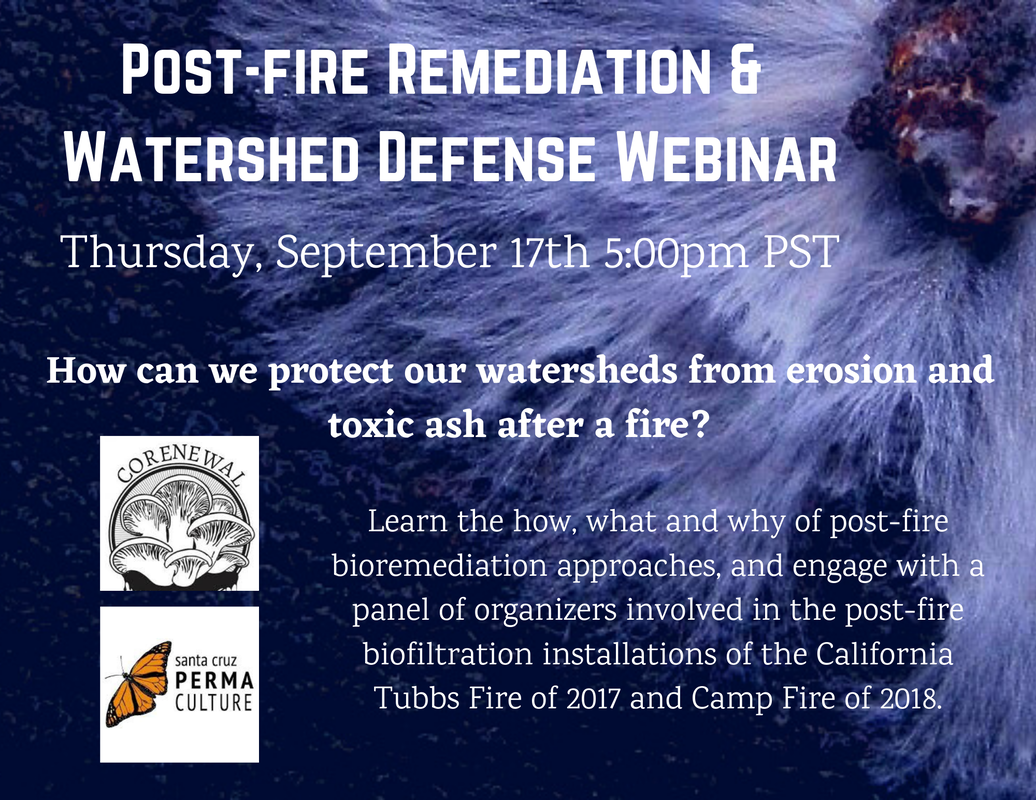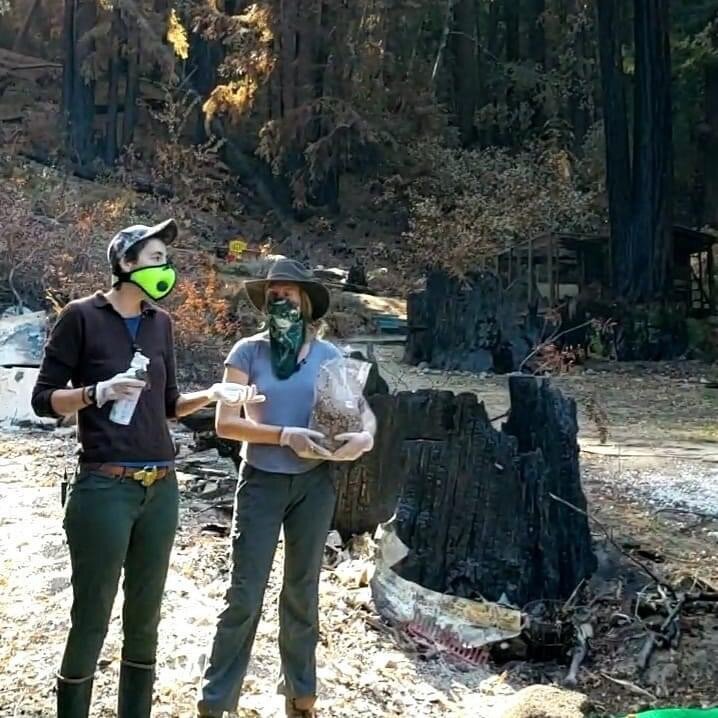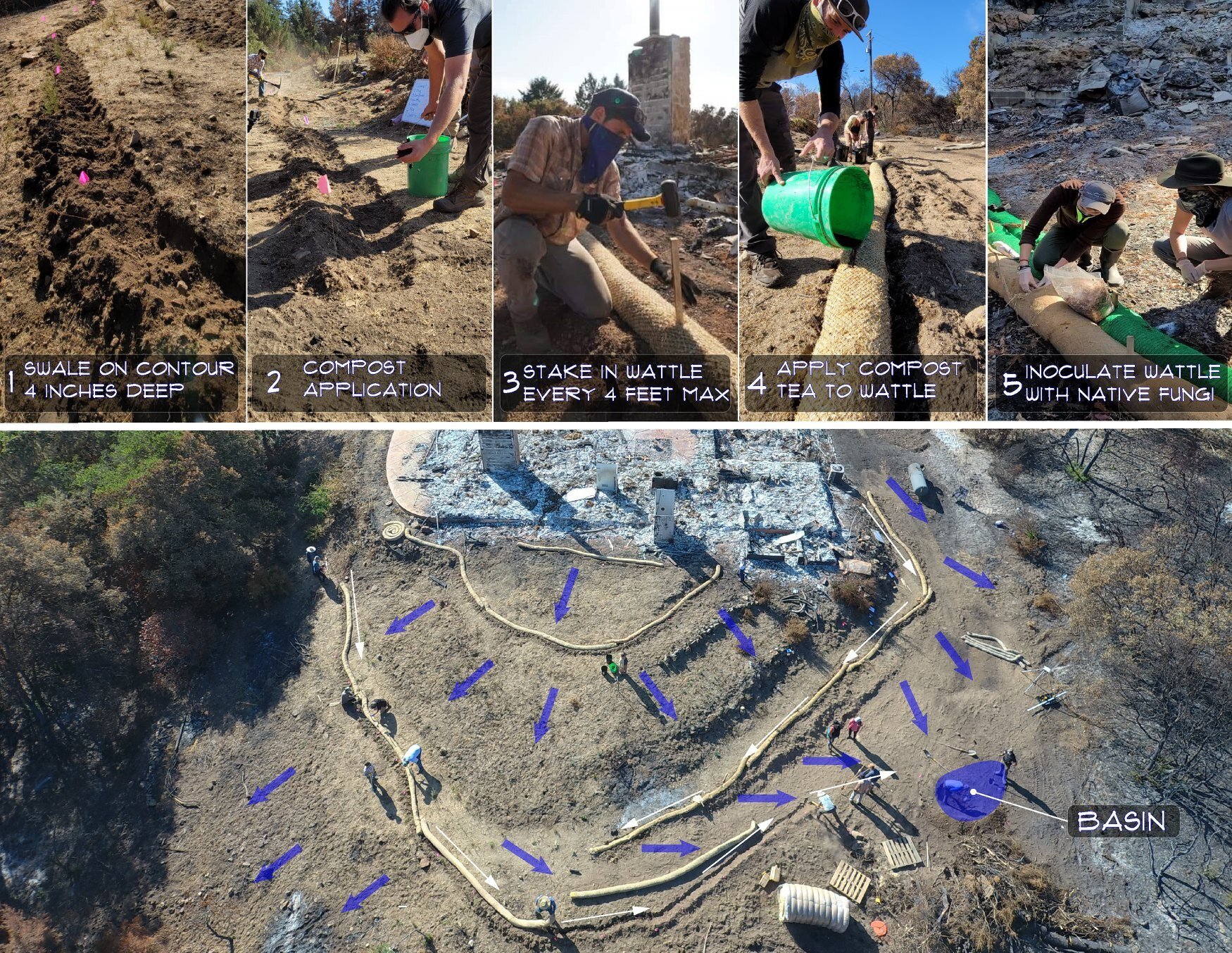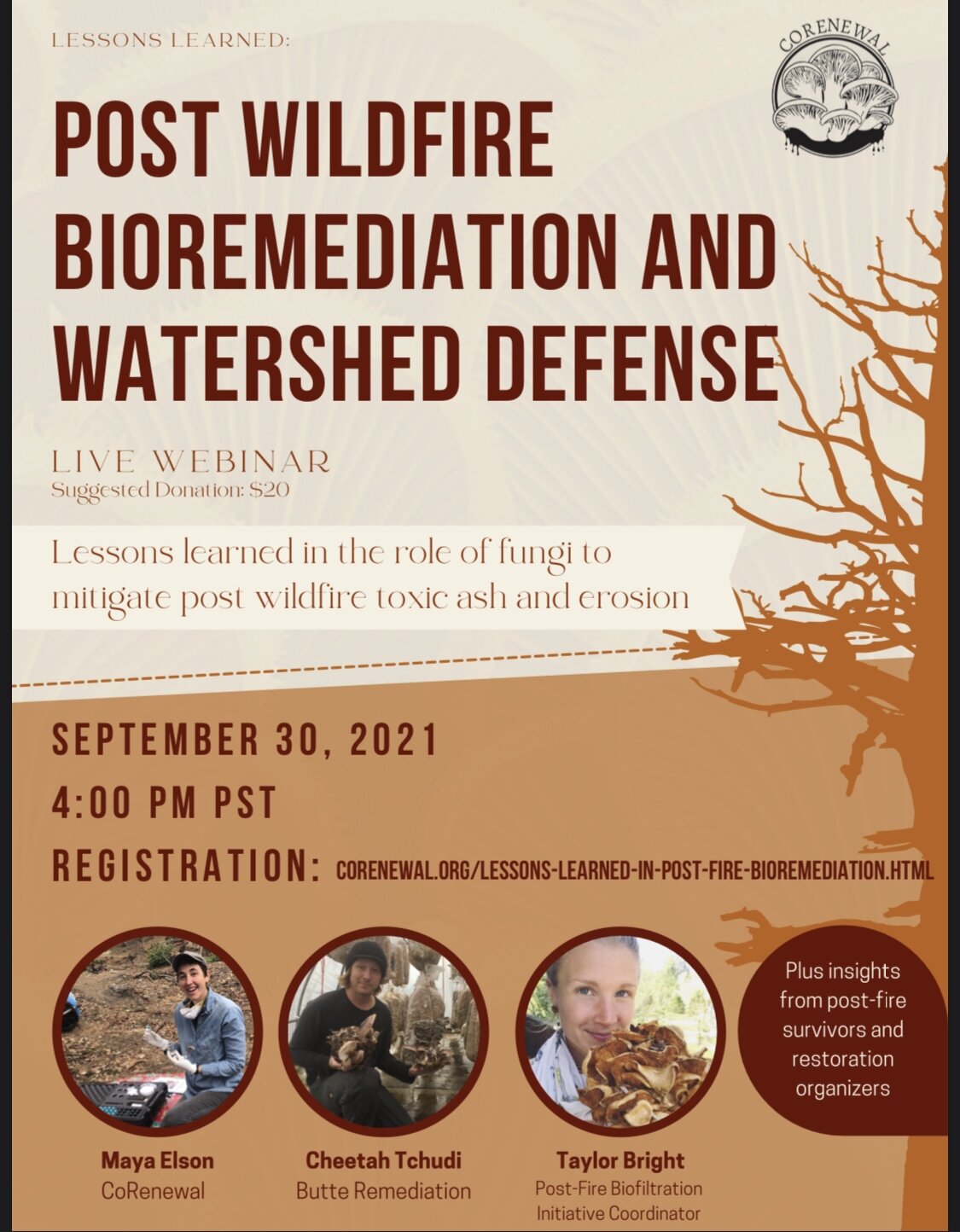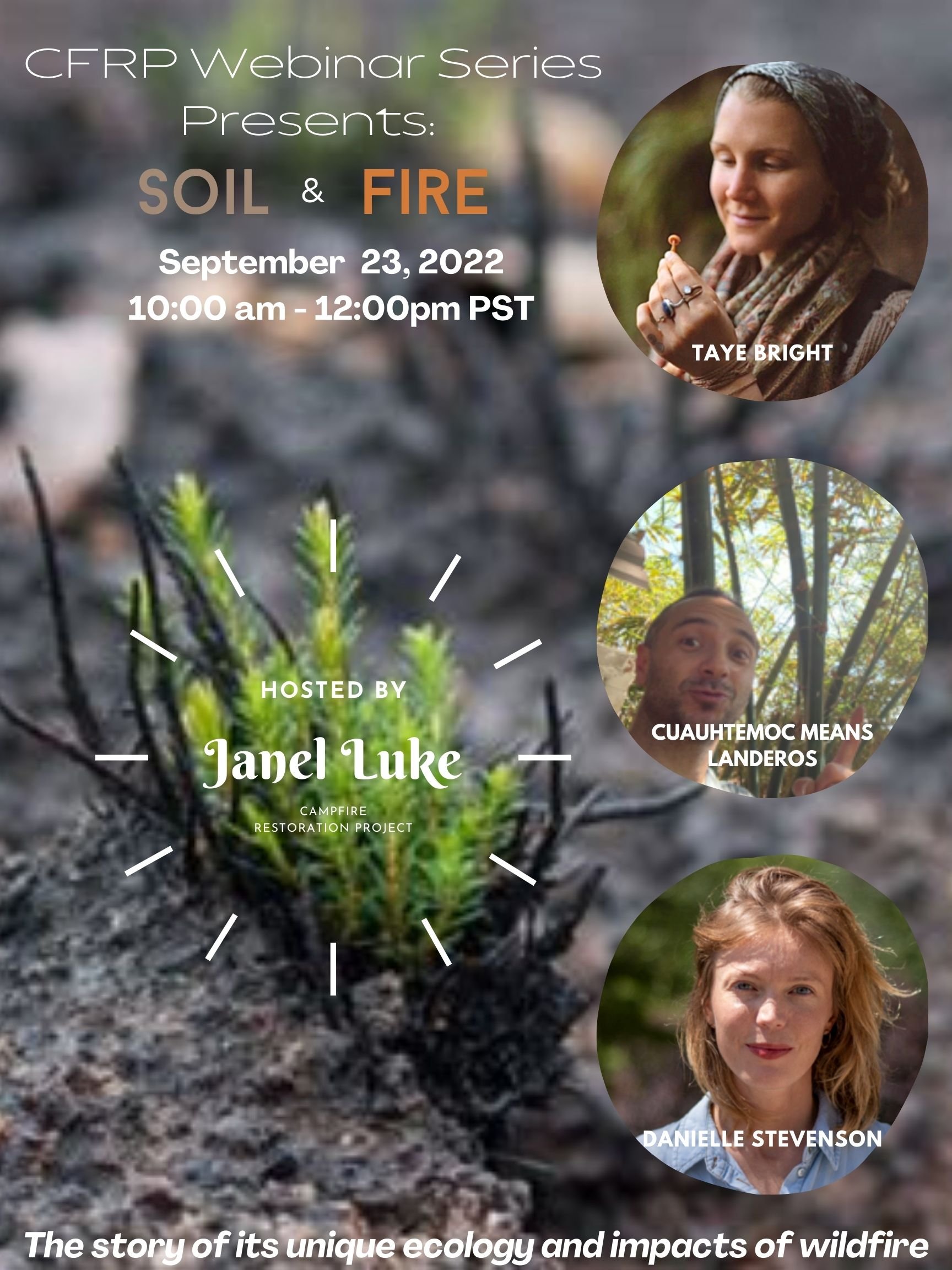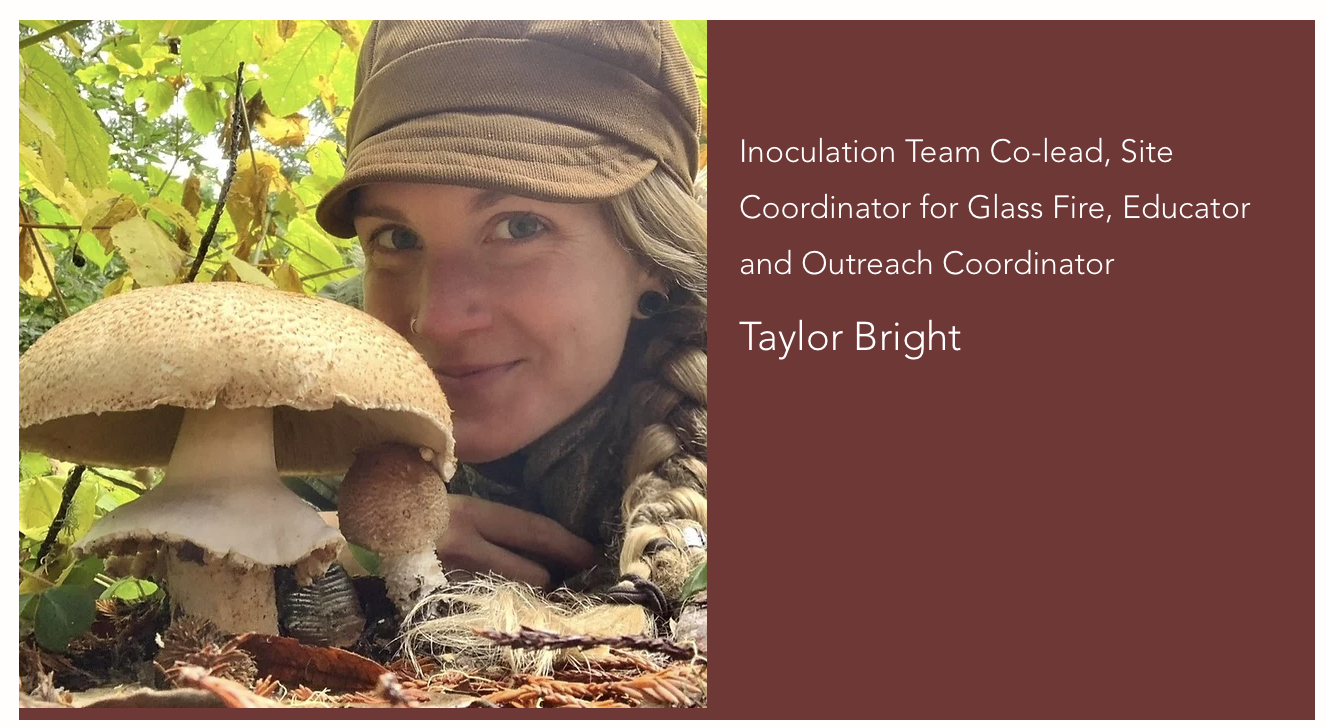CoRenewal (formerly known as Amazon MycoRenewal Project) is a 501(c)3 nonprofit organization dedicated to providing education and research in ecosystem restoration, health and healing, and sustainable community dynamics. CoRenewal is organized exclusively to conduct these activities: facilitate research, development, and implementation of solutions supporting ecosystem resilience; evaluate and ameliorate the impacts of environmental quality on individual and community health; engage in education, career-building, and research-oriented programs pertaining to ecology and sustainable community development.
Please read further into all of the incredible work CoRenewal is doing on our webpage, and consider donating towards ecological regeneration efforts.
Taye’s involvement in CoRenewal:
Introduction to Mycorenewal: Regeneration and Resilience
In this 6-week, 6-part online MycoRenewal Course, we provided participants with a comprehensive introduction to the diverse and dynamic world of mycology. We covered fungal biology, cultivation techniques, fungi for food and medicine, fungal ecosystem dynamics, and how to use fungi to regenerate degraded ecosystems.
I taught in Session 3: Post-fire Fungi and Mycofiltration, where I gave an overview of mycoremediation with an emphasis on the practice of mycofiltration (a form of remediation in which we use fungi to help decontaminate polluted water) as well as fungi’s role in soil systems.
The intention of this course to to cultivate and reinforce a worldwide mycelial network of people from various backgrounds to come together in mutually beneficial relationships with one another and the natural world.
Mycofiltration for Urban Storm Water Treatment Receives EPA Research and Development Funding. Paul Stamets 2013
This course is still available for purchase via donation
Fire & Fungi
In April of 2020, with anxiety high around California’s fire season approaching, Maya Elson and I created a four-month-long immersion: The Fire and Fungi Study Group. The group was an online community, gathering and exploring intersections of fire, fungi, ecology, the role of Indigenous practices for ecosystem health (TEK), and social justice. More specifically, we focused on the roles’ of fungi in fire ecologies, post-fire ecological regeneration and the potential mycoremediation of toxins.
We were fortunate to have Redbird Willie (Pomo/Wailaki/Wintu) as a guest speaker teaching about fire ecology and the cultural burning practices of his people. We were also blessed to have Alexii Sigona, a member of the Amah Mutsun Tribal Band, teach about Indigenous ethnobotany and ethnomycology, as well as guest teachers Sam Fox and Yamina Pressler. Thank you all so much!
Another ongoing and incredible project of CoRenewal is Fungal Facilitation & Fire. The focus here is to restore post-fire sites to emulate the conditions of pre-fire or unburned ecosystems and to evaluate the effects of fire on ecosystem functioning.
Post-Fire Remediation & Watershed Defense Webinar
In September of 2020 - one of the worst fire seasons in California’s history - we rallied communities of scientists, permaculturists, Earth stewards, and concerned citizens to present in the Post-Fire Remediation & Watershed Defense Webinar. We addressed varying land-based bioremediation practices that aim to regenerate burned ecosystems after wildfires.
During the webinar, I spoke on an array of accessible (DIY, low-cost, low-tech) remediation strategies that we can employ to help protect the surrounding ecosystems and watersheds from erosion and toxic ash runoff, with a focus on mycoremediation as it relates to burned structures.
It was an honor to speak alongside Matthew Trumm, a friend, father, fire survivor, dedicated Earth steward and the founder of the Camp Fire Restoration Project.
The Post-Fire Biofiltration Initiative (PFBI) & Watershed Defense
Concurrent with the frequency and severity of recent “megafires'“ in California, there are growing concerns regarding the toxic ash generated from wild-urban interface burns. We face unprecedentedly complex suites of contamination and the nearly ensured harm to downstream ecosystems.
In response, CoRenewal began researching and developing more effective and widely applicable methods with multiple benefits for our water, soil, communities. We are developing strategies for filtering, mitigating, and biodegrading toxic debris and ash runoff before it enters fragile ecosystems and waterways.
The aftermath of the 2020 August Fire at one of the remediation sites. You can see the rivers of solidified aluminum flowing from the cars.
A native species of Pleurotus pulmonarius I found from one of my favorite hikes in Occidental, CA to be cultured and used for research.
Tissue culturing the native Pleurotus to be used for wattle inoculation.
Pleurotus mycelium grown on sawdust inside of the straw wattle.
While there is evidence suggesting fungal-inoculated wattles may be a great post-fire remediation tool, this is one of few studies to scientifically examine these methods.
Our team seeks to determine the efficacy of straw wattles inoculated with a native fungus for capturing and filtering ash below homes burned by wildfires.
We have developed and implemented a robust experimental design that compares the efficacy of uninoculated wattles and wattles inoculated with a local Pleurotus species to quantify soil aggregates, biosorption of heavy metals, and biodegradation of petroleum before toxic debris and ash runoff enter high-risk waterways within burn sites across California.
In addition, we will collect samples from other grassroots experimental installations to provide baseline data on the use of multiple substrates, erosion-control technologies, microbial amendments and inoculants.
Furthermore, our research will elucidate the impacts, or unintended consequences, of these types of community-led initiatives to evaluate and refine best management practices for ameliorating the impact of toxic ash-effluent on sensitive ecosystems.
Data from this preliminary study will inform the expanded scope and nature of our proposed long-term study. Our intention is to use this data to promote evidence-based remediation techniques to further support ecological restoration of fire-affected areas, increase water retention within soils, and hopefully reduce the frequency and severity of future wildfires.
Find out more about our efforts here
Some of the more advanced systems for toxic runnoff control for burned structures.
This is in San Lorenzo River Watershed, Boulder Creek, California.
Here you can see some of the concepts we came up with during our assessment for two sites. This is the process and finished product of installing biodegradable and biologically active wattles and other remediation/erosion control measures to protect threatened waterways from toxic ash.
These concepts build watershed defense by slowing water down as high as possible in the micro-watershed (property), directing water away from very toxic zones, and enhancing forest health/ life already sprouting back.
Photo credit: Man Rivera with Permaculture Artisians
Media Coverage
1 year later
LESSONS LEARNED: POST WILDFIRE BIOREMEDIATION
AND WATERSHED DEFENSE WEBINAR
CoRenewal's Post-Fire Biofiltration Initiative (PFBI) is working to evaluate the efficacy of fungal inoculation, with the aim of developing widely applicable tools and methodologies to facilitate ecological regeneration and recovery in the aftermath of disaster and environmental injustice. In this participatory webinar, marking one year since the implementation of the PFBI project, we will share what we have learned. We will also discuss how you can organize and participate in post-fire watershed protection efforts, as well as how to contribute to community science that supports future efforts.
Speakers include Cheetah Tchudi of Butte Remediation, Taylor Bright, project coordinator of the Post-Fire Biofiltration Initiative and Maya Elson, executive director of CoRenewal and project manager Post-Fire Biofultration Initiative. Plus voices from fire survivors and experienced restoration organizers.
Soil & Fire
I had the honor of speaking on a webinar put on by The Camp Fire Restoration Project.
I speak on CoRenewals research in post-fire ecosystems, as well as introduce our new project FENiXS: Fire Ecology Network in X-site Study..
Fire Ecology Network in X-Site Study
Partners:
We are beginning Year 3 of research post-wildfire, as part of our award
from the Wildlife Conservation Society's Climate Adaptation Fund
Across sites, and throughout a latitudinal gradient, we add fungi or native microbial communities, as compared to conventional inoculation or erosion control treatments, and monitor over time to see how these treatments vary by environmental conditions, climate, and time since fire. We keep on collecting data, to learn about the effects of these restorative treatments on soil chemistry, elemental or aromatic pollutants, native plants, and soil microbes.
Project summary from the WCS website
Map of Climate Adaptation Fund projects from the WCS website
